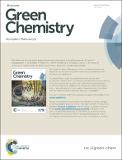Files in this item
Evaluating polymer-supported isothiourea catalysis in industrially-preferable solvents for the acylative kinetic resolution of secondary and tertiary heterocyclic alcohols in batch and flow
Item metadata
| dc.contributor.author | Guha, Nitul | |
| dc.contributor.author | Neyya Ppadath, Rifahath Mon | |
| dc.contributor.author | Greenhalgh, Mark | |
| dc.contributor.author | Chisholm, Ross | |
| dc.contributor.author | Smith, Samuel | |
| dc.contributor.author | McEvoy, Megan | |
| dc.contributor.author | Rodríguez-Escrich, Carles | |
| dc.contributor.author | Young, Claire M. | |
| dc.contributor.author | Pericas, Miquel A. | |
| dc.contributor.author | Hähner, Georg | |
| dc.contributor.author | Smith, Andrew D. | |
| dc.date.accessioned | 2019-08-22T23:44:14Z | |
| dc.date.available | 2019-08-22T23:44:14Z | |
| dc.date.issued | 2018-08-24 | |
| dc.identifier | 255537882 | |
| dc.identifier | 7d05db4f-6b53-459b-a849-91ad1f9da461 | |
| dc.identifier | 85054497937 | |
| dc.identifier | 000448411200020 | |
| dc.identifier.citation | Guha , N , Neyya Ppadath , R M , Greenhalgh , M , Chisholm , R , Smith , S , McEvoy , M , Rodríguez-Escrich , C , Young , C M , Pericas , M A , Hähner , G & Smith , A D 2018 , ' Evaluating polymer-supported isothiourea catalysis in industrially-preferable solvents for the acylative kinetic resolution of secondary and tertiary heterocyclic alcohols in batch and flow ' , Green Chemistry , vol. In press . https://doi.org/10.1039/C8GC02020E | en |
| dc.identifier.issn | 1463-9262 | |
| dc.identifier.other | ORCID: /0000-0002-2104-7313/work/47725764 | |
| dc.identifier.other | ORCID: /0000-0002-6765-344X/work/60426714 | |
| dc.identifier.uri | https://hdl.handle.net/10023/18357 | |
| dc.description | The authors thank the Royal Society and the Science and Engineering Board of India (SERB) for the award of a Royal Society-SERB Newton International Fellowship (N.R.G.). The authors also thank the EPSRC Centre for Doctoral Training in Critical Resource Catalysis (CRITICAT, grant code EP/L016419/1, R.M.N.P.) for funding. Financial support from the EPSRC (EP/K000411/1) is gratefully acknowledged (R.C.). The authors thank the European Research Council under the European Union's Seventh Framework Programme (FP7/2007-2013) ERC grant agreement no. 279850 (A.D.S). A.D.S. thanks the Royal Society for a Wolfson Research Merit Award. C.R.-E. and M.A.P. acknowledge the financial support from CERCA Programme/Generalitat de Catalunya, MINECO (CTQ2015-69136-R, AEI/MINECO/FEDER, UE and Severo Ochoa Excellence Accreditation 2014–2018, SEV-2013-0319) and DEC Generalitat de Catalunya (Grant 2014SGR827). | en |
| dc.description.abstract | Polymer-supported Lewis base catalysts, based on the homogeneous isothioureas HyperBTM and BTM, have been synthesised and applied for the acylative kinetic resolution of secondary and tertiary heterocyclic alcohols. In batch, the use of industrially-preferable solvents was investigated, with dimethyl carbonate proving to be most generally-applicable. Significantly, the HyperBTM-derived immobilised catalysts were readily recycled, with no loss in either activity or selectivity. In addition to the kinetic resolution of secondary benzylic, propargylic, allylic and cycloalkanol derivatives, a range of 21 tertiary heterocyclic alcohols, based on privileged 3-hydroxyoxindole and 3-hydroxypyrrolidinone substructures, were resolved with up to excellent selectivity (s = 7–190). Finally, the immobilised isothiourea catalysts were applied in a packed bed reactor to demonstrate the first example of the kinetic resolution of tertiary heterocyclic alcohols in a continuous flow process. High selectivities were obtained for the resolution of 3-hydroxyoxindole derivatives in ethyl acetate (s up to 70); and for 3-hydroxypyrrolidinones derivatives in toluene (s up to 42). | |
| dc.format.extent | 834853 | |
| dc.language.iso | eng | |
| dc.relation.ispartof | Green Chemistry | en |
| dc.subject | QD Chemistry | en |
| dc.subject | DAS | en |
| dc.subject.lcc | QD | en |
| dc.title | Evaluating polymer-supported isothiourea catalysis in industrially-preferable solvents for the acylative kinetic resolution of secondary and tertiary heterocyclic alcohols in batch and flow | en |
| dc.type | Journal article | en |
| dc.contributor.sponsor | EPSRC | en |
| dc.contributor.sponsor | EPSRC | en |
| dc.contributor.sponsor | European Commission | en |
| dc.contributor.sponsor | The Royal Society | en |
| dc.contributor.institution | University of St Andrews. School of Chemistry | en |
| dc.contributor.institution | University of St Andrews. EaSTCHEM | en |
| dc.contributor.institution | University of St Andrews. Biomedical Sciences Research Complex | en |
| dc.identifier.doi | https://doi.org/10.1039/C8GC02020E | |
| dc.description.status | Peer reviewed | en |
| dc.date.embargoedUntil | 2019-08-23 | |
| dc.identifier.grantnumber | EP/L016419/1 | en |
| dc.identifier.grantnumber | ep/k000411/1 | en |
| dc.identifier.grantnumber | N/A | en |
| dc.identifier.grantnumber | WM140071 | en |
This item appears in the following Collection(s)
Items in the St Andrews Research Repository are protected by copyright, with all rights reserved, unless otherwise indicated.

